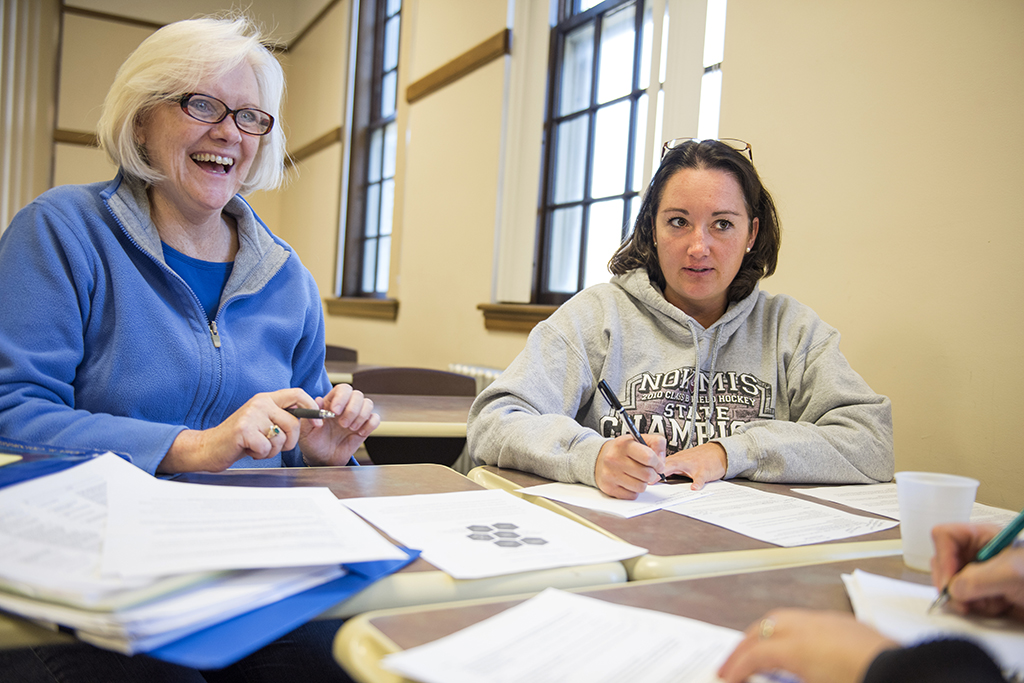Education (Ph.D.)
Degree overview
The Education Ph.D. at the University of Maine is an innovative doctoral program designed to provide students with a cross-disciplinary understanding of educational issues. We prepare future scholars, educational leaders, teacher-educators and policymakers to confront the complicated challenges in modern education, especially in rural settings. Our students can tailor their studies to match their research interests by choosing an area of specialization. For doctoral students interested in studying issues in PreK-12 education, our specializations include Special Education, Literacy Education, Prevention and Intervention Studies, and STEM Education. We also offer an individually designed program, as well as a doctoral program for graduate students interested in issues in Higher Education. Students in each of our specializations work across disciplines to seek innovative solutions to everyday problems in the field of education. This model emphasizes the benefits of team learning to show how professionals from different theoretical and practical backgrounds can address everyday problems faced by schools and other educational institutions.
NOTE: We are not accepting new students into the Prevention and Intervention concentration. Please check back at a later date. If you have questions about one of our Ph.D. concentrations, please contact the program coordinator.
Areas of Specialization
Request Information
Program faculty
Literacy Education
Susan Bennett-Armistead, Associate Professor of Literacy and Correll Professorship of Early Literacy
Debra Lewis Hogate, Maine Partnerships in Comprehensive Literacy Trainer
William Dee Nichols, Professor of Literacy
Timothy Reagan, Professor of World Language Education
Prevention and Intervention Studies
Jim Artesani, Associate Dean of Graduate Education, Research, and Outreach
Special Education
Sarah Howorth, Associate Professor of Special Education (program coordinator)
Jim Artesani, Associate Professor of Special Education
Melissa J. Cuba, Assistant Professor of Special Education
Sara Flanagan, Assistant Professor of Special Education
STEM Education
Justin Dimmel, Associate Professor of Mathematics Education and Instructional Technology
Elizabeth Hufnagel, Associate Professor of Science Education
Asli Sezen-Barrie, Associate Professor of Curriculum, Assessment and Instruction
Natasha M. Speer, Associate Professor of Mathematics
Michael C. Wittmann, Professor of Physics
Higher Education
Elizabeth Allan, Ph.D., Professor, Program Coordinator
Kathleen Gillon, Ph.D., Assistant Professor
Leah Hakkola, Ph.D., Assistant Professor
Careers
When you earn a Ph.D. in Education from the University of Maine you will be prepared for professorships at major research colleges and universities. Our graduates also have gone on to work for education policy organizations, or as administrators, principals and leaders at schools in Maine and beyond.
Program delivery
The Ph.D. in Education requires a minimum of 57 graduate credits beyond a master’s degree. Students will develop an initial program of study with their faculty advisor. Before enrolling in their fifth course, students must form a program committee consisting of three or more faculty members to finalize the program of study. The degree culminates with a qualifying paper/comprehensive exam. Program foundation include:
- Educational foundation (minimum 12 credit hours): All students are required to enroll in a professional seminar course at the beginning of doctoral studies. After that, students may choose three additional courses from a menu of options focusing on the philosophical, psychological and social aspects of education.
- Research foundation (minimum 15 credit hours): Includes a minimum of six credits in quantitative methods and six credits in qualitative methods. In addition, students must take at least one additional research course related to his or her professional or academic interests.
- Professional core (minimum 15 credit hours): A series of courses in the student’s discipline area — Literacy or Prevention and Intervention Studies.
- Research practicum (minimum 6 credit hours): In the fourth year of the program, each student in consultation with their advisor and program committee, will do a two semester research practicum specific to his or her area of specialization. This allows students to develop a literature review and implement field study in that area.
- Dissertation (minimum of nine credits)
Tuition and fees
For current information about tuition and fees, please visit the Bursar’s office.
To apply
Admission to the Ph.D. in Education program is based on several factors, including candidates’ past academic performance, future academic or research goals, as well as program resources. Candidates must posses a master’s degree and gain recommendation by faculty in their area of specialization. Please contact program faculty before you apply to seek a recommendation and to inquire about whether we are currently accepting new students. An interview may or may not be required. For application deadlines, check with the program coordinator for your desired concentration. Applications must be submitted through the University of Maine Graduate School. Application requirements:
- UMaine Graduate School application
- An essay (300-500 words) on academic and personal goals, including an special interest the candidate would like to pursue now or in the future
- Three letters of recommendation
- At least one letter of recommendation from a faculty member
- Official transcripts
- Graduate Record Examination scores (check with faculty in your desired area of specialization as some areas have suspended the GRE requirement)
- Interview, if required
- Additional requirements may be needed, depending on your desired area of specialization.
Please contact the program coordinator in your specialization area for more information.
- Literacy Education: Susan Bennett-Armistead, Ph.D.
- Prevention and Intervention Studies: Jim Artesani, Ph.D.
- Special Education: Sarah Howorth, Ph.D., BCBA
- STEM Education: Elizabeth Hufnagel, Ph.D.
- Higher Education: Elizabeth Allan, Ph.D.






